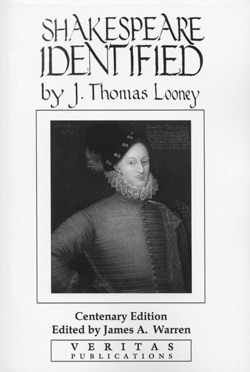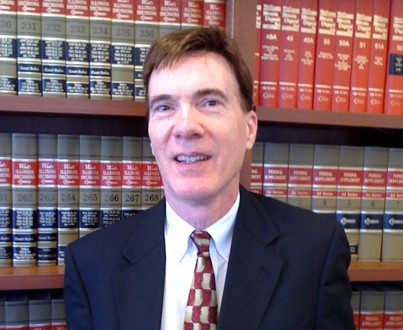Tom Regnier Centennial Presentation, March 4, 2020
by Bryan H. Wildenthal
May 27, 2020 — The late Tom Regnier’s Centennial Symposium presentation, “Justice Stevens, the Law of Evidence, and the Shakespeare Authorship Question,” is now available on the SOF YouTube channel. Regnier was the second of five speakers at the SOF “Shakespeare” Identified Centennial Symposium held on March 4, 2020, at the National Press Club in Washington, D.C.
 The symposium was held 100 years to the day after the publication of “Shakespeare” Identified in Edward de Vere the Seventeenth Earl of Oxford. That historic 1920 book by British scholar J. Thomas Looney launched the modern Oxfordian theory of Shakespeare authorship. The presentations by James A. Warren and Cheryl Eagan-Donovan were recently posted on the SOF YouTube channel. (Update: Also now available on YouTube are the presentations by Bonner Miller Cutting and Professor Roger Stritmatter.)
The symposium was held 100 years to the day after the publication of “Shakespeare” Identified in Edward de Vere the Seventeenth Earl of Oxford. That historic 1920 book by British scholar J. Thomas Looney launched the modern Oxfordian theory of Shakespeare authorship. The presentations by James A. Warren and Cheryl Eagan-Donovan were recently posted on the SOF YouTube channel. (Update: Also now available on YouTube are the presentations by Bonner Miller Cutting and Professor Roger Stritmatter.)
Tom and the other speakers were introduced by the Centennial Symposium moderator, award-winning journalist and author Bob Meyers, who served formerly as president of the National Press Foundation and director of the Harvard Journalism Fellowship for Advanced Studies in Public Health.
This final lecture by Tom has great emotional poignancy for all of us in the SOF, since he died six weeks later on April 14. Vigorous, healthy, and remarkably youthful-looking at age 69, Tom was cut down brutally and unexpectedly at the height of his professional success and personal happiness, after contracting the Covid-19 virus in southern Florida, where he lived and worked as a busy practicing attorney.
Tom earned his J.D. summa cum laude in 2003 at the University of Miami School of Law, where he taught “Shakespeare and the Law” for many years as an adjunct professor. He earned his LL.M. in 2009 at Columbia Law School, where he was a Harlan F. Stone Scholar. He also taught at Chicago’s John Marshall Law School. He became a prolific independent Shakespearean scholar, combining his interests in Shakespeare and the law. He served as President of the SOF (2014–18) and was honored as Oxfordian of the Year in 2016.
For more details on Tom’s remarkable life and career, see his full SOF obituary published April 25. A separate news article has been published on the SOF website today, available here, collecting numerous remembrances and tributes to Tom by members of the SOF and our British sister organization, the De Vere Society.

Tom’s valedictory presentation on March 4 is eerily fitting in hindsight, as it gave him the opportunity to share his knowledge and passion for Shakespeare, the law, and the authorship question on a truly momentous and once-in-a-lifetime occasion — the exact centennial of the launching of the modern Oxfordian theory. Furthermore, it allowed Tom to explore the significance of one of the greatest Oxfordians of all time, and a fellow lawyer — the late Justice John Paul Stevens, who was born on April 20, 1920, just a month and a half after Looney’s book was published, and who passed away less than a year short of his own centennial on July 16, 2019.
Stevens was one of the longest-serving and most admired Supreme Court justices in American history, whose tenure on the Court lasted 35 years, from 1975 to 2010. The professional thrill of Tom’s life was his opportunity to meet Justice Stevens in his Court chambers on November 12, 2009, when he joined several other Oxfordian lawyers in presenting Stevens with the Oxfordian of the Year award. Tom recounted all this, and memorialized Justice Stevens, in an article he published on this website on July 17, 2019, the day after Stevens died.
When Justice Stevens, not long after his death, was churlishly and falsely depicted as a conspiracy theorist by Professor James Shapiro, Tom leaped to Stevens’s defense. He delivered an eloquent memorial tribute to Justice Stevens at the October 2019 SOF conference at the Mark Twain House and Museum in Hartford, Connecticut. (For refutations of the “conspiracy theorist,” “snobbery,” and other false, incoherent, and offensive slanders often directed toward Oxfordians and other Shakespeare authorship doubters, see this essay.)
Tom’s centennial presentation thus gave him the perfect opportunity to renew his defense and celebration of this great jurist, and the powerful scholarship of J. Thomas Looney which launched the theory and began the exploration of the evidence that would later persuade Justice Stevens to take a fresh look at the Shakespeare authorship question — along with thousands of other judges, lawyers, doctors, professors, scholars, writers, artists, great Shakespearean actors, and thoughtful people from all walks of life, in countries around the world.
This talk is the eighth presentation by Tom posted on our YouTube channel. The two most-viewed videos by a wide margin, out of more than 70 currently posted, are Tom’s outstanding introductions to the Shakespeare authorship question (SAQ). Indeed, three of the top ten most-viewed SOF videos are currently by Tom. Following is a summary of Tom’s previous videos:
- “Did Shakespeare Really Write Shakespeare?” (library talk) — delivered February 11, 2016, at the North Palm Beach Public Library, Florida (56 minutes, posted on YouTube March 31, 2016, #1 on our channel with more than 31,000 views): This talk, consisting of power-point slides with voice-over by Tom, presents essentially the same material as the second video below. The concise length and audio-visual format of this version make it well-suited for classroom use. Any nonprofit educational use of our YouTube videos is always welcomed and encouraged; no need to ask advance permission, but we always love to hear about and get feedback on any such uses.
- “Did Shakespeare Really Write Shakespeare?” (Gable Stage) — delivered April 11, 2016, at the Gable Stage Theatre in the historic Biltmore Hotel, Coral Gables, Florida (89 minutes, posted April 29, 2016, #2 with more than 30,000 views): This talk, introduced by award-winning director Joseph Adler, shows Tom speaking, with Q&A at the end, and has been widely praised for its enjoyable, inviting, and persuasive clarity.
- “The Law of Evidence and the Shakespeare Authorship Question” — delivered September 27, 2015, at the SOF Annual Conference in Ashland, Oregon (40 minutes, posted Dec. 7, 2015, #8 with more than 7,600 views): This concise talk has been hailed as perhaps the best Tom ever recorded (he recaps key points from it in his final centennial lecture). Instead of surveying the entire SAQ, Tom focuses on the nature and meaning of evidence, including the distinction between “direct” and “circumstantial” evidence (the latter is very often more reliable and persuasive, as he lucidly explains), and between “evidence” and “proof.” He concludes by discussing what the laws of probability suggest about the true identity of the author who used the pen name “Shakespeare.” Tom’s final slide sums up his life’s perspective as a lawyer, scholar, and Oxfordian — “Demand Evidence and Think Critically” — an enduring challenge to those who simply yield to the Stratfordian dogma about “Shakespeare” (as most do) out of faith or received tradition, without seriously questioning or looking into the issue.
- “Hamlet and the Law of Homicide: The Life of the Mind in Law and Art” — delivered May 22, 2017, at ArtServe, Fort Lauderdale, Florida; originally delivered at the 2014 SOF Annual Conference in Madison, Wisconsin (64 minutes, posted June 26, 2017): This fascinating talk explores references in Hamlet that reveal the author’s profound knowledge of law, especially the evolution away from the medieval focus on a person’s physical actions to the modern emphasis on state of mind and intentions. It was selected in 2016 by the Dade County (Florida) Bar Association to inaugurate the Thurgood Marshall Distinguished Lecture Series, named for the first African American to serve (1967–91) as a justice of the U.S. Supreme Court.
- “60th Anniversary of the Shakespeare Oxford Fellowship” — delivered October 14, 2017, at the SOF Annual Conference in Chicago (41 minutes, posted Jan. 26, 2018): This talk provides a lively and informative overview of the history of the SOF as an organization and its recent activities.
- “What Did Shakespeare Mean by ‘Kill All the Lawyers’?” — delivered October 18, 2019, at the SOF Annual Conference, Mark Twain House and Museum, Hartford, Connecticut (36 minutes, posted Jan. 3, 2020): This talk explores one of the most provocative lines in the Shakespeare canon (from Henry VI, Part 2), one often gleefully repeated by non-lawyers. Yet lawyers themselves, as Tom humorously explains, have tried to turn it to their advantage. What the heck did the playwright really mean? Great fun!
- “Tribute to Justice Stevens” (with Alex McNeil) — delivered October 18, 2019, at the SOF Annual Conference, Mark Twain House and Museum, Hartford, Connecticut (15 minutes, posted Feb. 29, 2020): This talk honors Justice John Paul Stevens (1920–2019), 2009 Oxfordian of the Year, who served 35 years on the U.S. Supreme Court (1975–2010). For more on Justice Stevens and other Oxfordians and authorship doubters who have served on the Supreme Court, see this article.
[published May 27, 2020, updated August 2020]
Membership dues cover only a fraction of our budget, including all our research, preservation and programming. Please support the SOF by making a gift today!
Blue Boar Tavern: Wassail Q&A
Tuesday Dec. 17, 8pm E / 5pm P
Sign up below for event invites!
